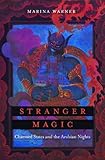Stranger Magic : Charmed States and the Arabian Nights / Marina Warner.
Material type: TextPublisher: Cambridge, MA : Harvard University Press, [2012]Copyright date: ©2012Description: 1 online resource (560 p.) : 25 color illustrations, 55 halftonesContent type:
TextPublisher: Cambridge, MA : Harvard University Press, [2012]Copyright date: ©2012Description: 1 online resource (560 p.) : 25 color illustrations, 55 halftonesContent type: - 9780674065079
- online - DeGruyter
| Item type | Current library | Call number | URL | Status | Notes | Barcode | |
|---|---|---|---|---|---|---|---|
 eBook
eBook
|
Biblioteca "Angelicum" Pont. Univ. S.Tommaso d'Aquino Nuvola online | online - DeGruyter (Browse shelf(Opens below)) | Online access | Not for loan (Accesso limitato) | Accesso per gli utenti autorizzati / Access for authorized users | (dgr)9780674065079 |
Browsing Biblioteca "Angelicum" Pont. Univ. S.Tommaso d'Aquino shelves, Shelving location: Nuvola online Close shelf browser (Hides shelf browser)

|

|

|

|

|

|

|
||
| online - DeGruyter Is American Science in Decline? / | online - DeGruyter Godly Republicanism : Puritans, Pilgrims, and a City on a Hill / | online - DeGruyter The Rise of Nuclear Fear / | online - DeGruyter Stranger Magic : Charmed States and the Arabian Nights / | online - DeGruyter The Harm in Hate Speech / | online - DeGruyter Stylish Academic Writing / / | online - DeGruyter Routes of War : The World of Movement in the Confederate South / |
Stranger Magic -- Frontmatter -- A Note on the Text -- Contents -- List of Illustrations -- Acknowledgements -- Introduction -- Part I. Solomon the Wise King -- Story 1. The Fisherman and the Genie -- Chapter one. Master of Jinn -- Story 2. The City of Brass -- Chapter two. Riding the Wind: The Flying Carpet I -- Story 3. Prince Ahmed and the Fairy Peri Banou -- Chapter three. A Tapestry of Great Price: The Flying Carpet II -- Part II. Dark Arts; Strange Gods -- Story 4. The Prince of the Black Islands -- Chapter four. The Worst Witch -- Chapter five. Egyptian Attitudes -- Story 5. Hasan of Basra -- Chapter six. Magians and Dervishes -- Story 6. A Fortune Regained -- Chapter seven. Dream Knowledge -- Part III. Active Goods -- Chapter eight ‘Everything You Desire to Know about the East ...’ -- Story 7. The Greek King and Doctor Douban -- Chapter nine. The Thing-World of the Arabian Nights -- Story 8. Abu Mohammed the Lazy -- Chapter ten. The Word of the Talisman -- Story 9. Marouf the Cobbler -- Chapter eleven. The Voice of the Toy -- Chapter twelve. Money Talks -- Part IV. Oriental Masquerades -- Chapter thirteen. Magnificent Moustaches: Hamilton’s Fooling, Voltaire’s Impersonations -- Story 10. Rosebud and Uns al-Wujud the Darling Boy -- Chapter fourteen. ‘Symbols of Wonder’: William Beckford’s Arabesque -- Chapter fifteen. Oriental Masquerade: Goethe’s West-Eastern Divan -- Part V. Flights of Reason -- Story 12. Camar al-Zaman and Princess Badoura -- Chapter sixteen. Thought Experiments: Flight before Flight -- Chapter seventeen. Why Aladdin? -- Chapter eighteen. Machine Dreams -- Story 13. The Ebony Horse -- Chapter nineteen. The Shadows of Lotte Reiniger -- Story 14. Aladdin of the Beautiful Moles -- Chapter twenty. The Couch: A Case History -- Story 15. Prince Ardashir and Hayat al-Nufus -- Conclusion: ‘All the story of the night told over ...’ -- Glossary -- Abbreviations -- The Stories -- Notes -- Bibliography -- Index
restricted access online access with authorization star
http://purl.org/coar/access_right/c_16ec
Our foremost theorist of myth, fairytales, and folktales explores the magical realm of the imagination where carpets fly, objects speak, dreams reveal hidden truths, and genies grant prophetic wishes. Stranger Magic examines the wondrous tales of the Arabian Nights, their profound impact on the West, and the progressive exoticization of magic since the eighteenth century, when the first European translations appeared. The Nights seized European readers’ imaginations during the siècle des Lumières, inspiring imitations, spoofs, turqueries, extravaganzas, pantomimes, and mauresque tastes in dress and furniture. Writers from Voltaire to Goethe to Borges, filmmakers from Raoul Walsh on, and countless authors of children’s books have adapted its stories. What gives these tales their enduring power to bring pleasure to readers and audiences? Their appeal, Marina Warner suggests, lies in how the stories’ magic stimulates the creative activity of the imagination. Their popularity during the Enlightenment was no accident: dreams, projections, and fantasies are essential to making the leap beyond the frontiers of accepted knowledge into new scientific and literary spheres. The magical tradition, so long disavowed by Western rationality, underlies modernity’s most characteristic developments, including the charmed states of brand-name luxury goods, paper money, and psychoanalytic dream interpretation. In Warner’s hands, the Nights reveal the underappreciated cultural exchanges between East and West, Islam and Christianity, and cast light on the magical underpinnings of contemporary experience, where mythical principles, as distinct from religious belief, enjoy growing acceptance. These tales meet the need for enchantment, in the safe guise of oriental costume.
Mode of access: Internet via World Wide Web.
In English.
Description based on online resource; title from PDF title page (publisher's Web site, viewed 23. Jun 2020)


